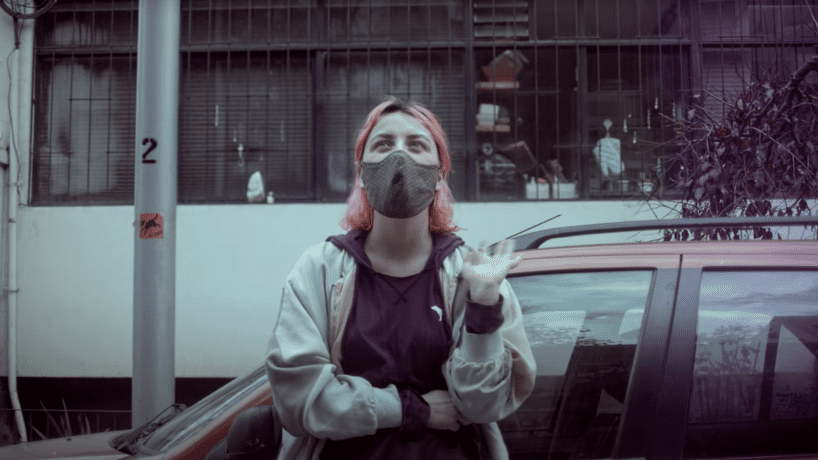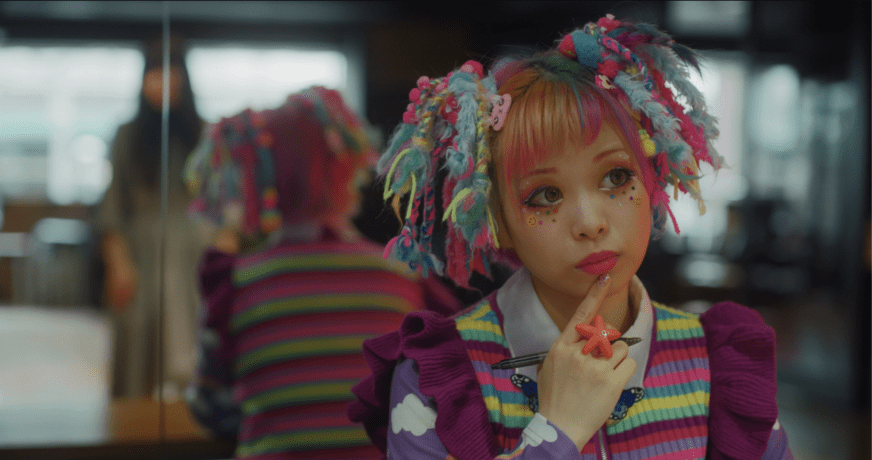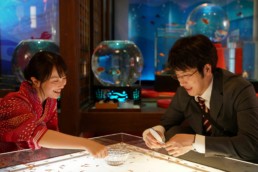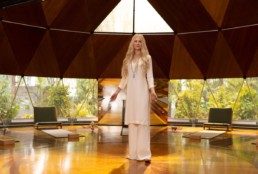'The Year of the Everlasting Storm' Is What Pandemic Cinema Looks Like
The Year of the Everlasting Storm is a collection of films from seven of contemporary cinema's most celebrated directors, whose distinct aesthetics each create various expressions that showcase how they dealt with living through a global pandemic. Equally heartfelt and unique, Jafar Panahi, Anthony Chen, Malik Vitthal, Laura Poitras, Dominga Sotomayor, David Lowery, and Apichatpong Weerasethakul each craft stories so deep and expressive in just 20 minutes, it feels as if we're getting a peek into the inner workings of their minds throughout the most chaotic of times.
The Year of the Everlasting Storm takes its name from a short poem that is presented onscreen, kicking off the anthology series in a seemingly chaptered and formulaic way (and no, it's not a callback to David Lowery's The Green Knight, where prior knowledge of the aforementioned poem is encouraged beforehand). However, of the seven films presented, no two are alike–much like the directors themselves. From Jafar Panahi's mumblecore family dramedy in Iran, to Laura Poitras's investigative political documentary in New York, The Year of the Everlasting Storm is a cinephile's smorgasbord that tells very different global stories from very different perspectives. The only underlying commonality is the pandemic production-affected restraints in which the films were made.

We all react to stress and despair in different ways. Some turn to family, others turn inward, but a majority of us all desperately want one thing: to connect. This theme of reconnection is prevalent throughout all of the films, be it in a literal sense or more abstract. David Lowery's film focuses on a woman's quest to revisit her past. Malik Vitthal's mixed media piece is centered around reclaiming his family. Anthony Chen tells a story about a struggling young couple on the verge of a marital breakdown. And Dominga Sotomayor shares a portrait of a middle-aged woman longing to play a motherly role in her daughter's life.
Perhaps the simplest entry (and my personal favorite) is the observational closing film from Thai master Apichatpong Weerasethakul. His films always stay true to the present moment and this is no different. Intricate attention to sound and his visual patience are what tie everything together. Weerasethakul is able to recenter us, bringing our thoughts back to the here and now.
The Year of the Everlasting Storm, which made its premiere at this year's Cannes Film Festival, should be enjoyed as a time capsule of modern-day life through filmmaking. Playing more like a museum gallery exhibition rather than a traditional film with plot structure or character development, this anthology series is a remarkable piece of art that transcends boundaries and creative restraints.
Distributed by NEON. Opening at the Laemmle Royal this Friday.
'Moments Like This Never Last' Review: Do You Know Dash Snow?
"What keeps you alive?" Iconoclast and legendary NYC artist Dash Snow struggles to find an answer. What he isn't able to articulate is all too apparent to those who knew and loved the mischievous rebel; his love for creating art, his relationships with his friends, and devotion to the city that raised him, NYC, all contributed to why Snow continued to wake up day after day, until one day, that wasn't enough anymore. As documented in director Cheryl Dunn's memoir, Moments Like This Never Last, audiences are given an intimate look into the personal life of another artist gone too soon.
Dash Snow was born Dashiell Alexander Whitney Snow and had always rejected the inherent privilege that came from being born into a wealthy family. He had nothing against his parents but wanted to find success the old-fashioned way: through hard work and dumb luck. Dash was a true student of the school of hard knocks, living his life doing dumb stuff with his equally grimy friends on the street of New York City, and creating magic in his path.
He had a polaroid camera with him wherever he went and those pictures became Dash's legacy. The energy of 2000s NYC–pre-internet–is captured with such palpable energy and Cheryl Dunn does a stellar job bringing Dash's spirit to life through his photos, home videos, and interviews with his friends and collaborators like Ryan McGinley and Larry Clark (Kids).

Unfortunately, there was a stronger love that overtook his passion for making art and staying sober for his girlfriend, Jade Berreau, and their young daughter, Secret, and that was drugs. There is an unspoken pressure in the art world that to succeed, you must "be crazy, and do a lot of drugs." Heroin didn't become prevalent in Dash's life until after he had some buzz to his name and that's what ended up killing him in an East Village hotel room at the age of 27.
Dash Snow was a charismatic, complicated, and outrageously talented figure who many compared to Basquiat. His signature style of politically charged graffiti and sexually explicit photos (snorting coke off an erect penis being one of his most infamous) cemented him as a legendary fixture in the post-punk revival arts scene.
Moments Like This Never Last pays tribute to the live fast lifestyle that Dash embraced. In a similar fashion, Cheryl Dunn's portrayal is a gritty labor of love that makes us feel like we knew him personally, too. Made in collaboration with VICE studios, the film also features music from LCD Soundsystem, Nick Cave with Grinderman, Cat Power, with an original score by Brian DeGraw.
Distributed by Utopia Media. Opening this Friday at Laemmle Cinemas and on VOD.
'Dreams on Fire' Fantasia Review: An Electric Underground Dance Drama
Waiting on the sidelines of a dimly lit dance floor in an otherwise neon-soaked Tokyo club, a Yume (Bambi Naka) is about to live out her biggest dream and face her biggest fear. By stepping out onto the dance floor, she is quite literally taking her first step towards becoming a professional dancer. But with little formal training and no money to her name, Yume is prepared to give her blood, sweat, and tears to turn this dream into a reality.
Canadian-born, Japan-based filmmaker Philippe McKie's underground dance drama Dreams on Fire is a fascinating character study of a young woman's stalwart ambition to succeed. Mesmerizing choreography and heavy-hitting music from IC3PEAK, S.P.Y, Hospital Records, and Shogun Audio contribute to the film's vibey EDM aesthetic and electrifying narrative.
Before she found herself in that Tokyo nightclub, Yume was an aspiring dancer from a small country village. Convinced that she'll receive no opportunities in her small town, she naively runs away from home and heads to Tokyo where she believes her future awaits her. Yume is a beautiful girl but lacks agency and general life experience, making her an easy target for the vultures of the darker side of the dance world.

Initially, Yume lands a job as a "hostess" which turned out to be nothing more than a female companion for wealthy businessmen. Then, seeing an opportunity to focus on dancing, she accepts a role as a go-go dancer for fetish nights at a seedy nightclub in the city. Unknowingly, Yume starts heading down a slippery slope as the roles become more and more sexual; they are technically dance-related, but not the kind she ultimately wants.
Not one to give up, she continues to hustle toward her professional aspirations until a chance encounter sets her on a different trajectory.Hands down, Bambi Naka is the undiscovered highlight of Dreams on Fire. The former lead dancer on Madonna's "Rebel Heart Tour," Bambi makes her feature film debut as a complex, layered character whose talent is equally matched by her ambition. She is mesmerizing to watch, both in dialogue-heavy scenes and scenes that show off her incredible dance floor agility. I really hope to see more of her in films to come.
In addition to the awe-inspiring performance from Naka, the supporting cast is equally as energetic and commanding on-screen. Standouts include model, YouTube make-up influencer, and Harajuku Fashion icon Haruka Kurebayashi; popular idol group Akishibu Project member Rinomaru; adult-film star Okuda Saki; celebrated fetish and circus performer YUSURA; and Mika, Mirin, and Yuriya of the internationally recognized, widely acclaimed go-go dance crew CyberJapan.
Dreams on Fire is a testament to Lady Gaga's favorite quote, "There can be a hundred people in the room, and 99 don't believe in you, but one does." She was roasted on the awards circuit in 2018 for repeating that statement over and over again, but there's no denying that it's good advice. Advice that Yume stuck with and ultimately led to her life-changing big break.
'Love, Life and Goldfish' Fantasia Review: A J-Pop Love Story
Full disclosure: I've never listened to a BTS song all the way through (much to the horror of one of my closest friends). I was shocked to discover that the girl group BLACKPINK has over 40 million Instagram followers. However, despite not being familiar with the K-pop or J-pop genre specifically, I've always been a fan of movie musicals, which is why I was intrigued by Love, Life and Goldfish. Based on the manga series “Sukutte Goran” by Noriko Otani and directed by Yukinori Makabe, this was the perfect introduction to J-pop for a novice like myself.
Our protagonist, Makoto Kashiba (Matsuya Onoe) is a young businessman who has been exiled from his high-profile job at a Tokyo banking firm and relocated to a small town in the middle of nowhere. After making a critical mistake on the job, Makoto is full of self-doubt, apathy, and confidence. Upon arriving at his new place of employment, he meets Yoshino Ikoma (Kanako Momota) a local woman who works at a consumer-friendly goldfish game shop nearby. Her childlike bewilderment and lassie fare attitude are initially off-putting to the logic-based Makoto, but over time he begins to see that her view of the world is nothing to judge and starts to fall in love. But his love for Yoshino doesn't come without its complications, specifically the attention from another man.

Yoshino is far more than just Makoto's manic pixie dream girl, although she does contribute to him finding happiness again. In addition to reviving Makoto's mood by using her beloved goldfish, which she claims bring out the inner child, joy, and happiness, she too suffers from poor self-confidence. Yoshino has ambitions and dreams of her own that Makoto helps her achieve, playing the piano in public being her biggest obstacle to overcome. Their shared sense of fear of failure is what makes their bond so special. In the most complimentary way, they have a "reject finds reject" love story that resonates on a universal level.
Love, Life and Goldfish is a fairly standard romantic comedy much like John Carney's Sing Street (but nothing like Leos Carax's Annette). Short musical ditties (both in English and Japanese) keeps the film flowing nicely and make for a lighthearted time. Staying true to its theatrical roots, there is a brief one-minute and 30-second intermission about halfway through the film and it ends with a big finale song and dance number. The performances are fabulous and flamboyant, the visuals are colorful and magical, and the music itself is contagiously upbeat. Love, Life and Goldfish thrives off of its musical numbers and has officially succeeded in converting me to a J-pop fan.
'Alien on Stage' Fantasia Review: Amateurs Remake a Sci-Fi Classic
Directors Lucy Harvey and Danielle Kummer found a needle in a haystack when they stumbled into a low-budget production of Ridley Scott's Alien at a local theatre in Dorset. The small coastal town in the southwest of England featured handmade costumes to sub-par performances. And yet, there was something so incredibly charming about this production and the genuineness of the people involved that the directors knew this was something that should be seen by the world (and not just the handful of people who made up the theatre troop's small audience).
The result is Alien on Stage. A heartwarming story about an eclectic cast of bus drivers and aspiring thespians from a small English town, they are given the opportunity of a lifetime: to perform their humble stage play adaptation of Alien to a 400-seat, sold-out crowd at the Leicester Square Theatre in London for one night only. For context, Dorset is 2 1/2 hours south of London, and their audience count was roughy around 20 people per show.
Watching this ensemble of amateur actors is like watching a Christopher Guest film come to life. There is a consistent flow of cringe-worthy and charismatic moments throughout that make for quietly hilarious and lighthearted entertainment. Led by army veteran turned theatre director Dave Mitchell (with heavy Michael Scott-like qualities), he is tasked to bring Alien to theatrical life.
His kooky cast consists of his wife who plays Ridley, his son who agrees to stage-manage, and a handful of middle-aged bus drivers who got bit by the acting bug later in life. Their combined efforts to make Alien the highest quality production despite monetary restrictions and lack of "formal" acting skills is a sweet reminder that passion outweighs everything else. To see them having fun and finding purpose in their work (despite the questionable feedback) brings a contagious positivity that outlasts the length of the film.
The film's physical execution also lends itself to the overall blatant awkwardness. Despite Alien on Stage looking like it was shot in the mid-90s with outdated technology and questionable fashion choices, the documentary is, in fact, a modern film. This is something I was told repeatedly but had a hard time believing until I confirmed it myself.
Alien on Stage is the definition of "charming." In front of and behind the camera, this is a testament to never giving up on your dreams because you never know when your lucky break will come. And who doesn't want to watch a film about lovable misfits shooting for the moon and landing among the stars? For one night, at least.
First Listen From Hulu's 'Nine Perfect Strangers'
If you're looking for a new show to binge-watch, we have your answer right here: Nine Perfect Strangers. Based on The New York Times bestselling book by Liane Moriarty, the series' initial (and obvious) draw is its stellar cast, which includes Nicole Kidman as a mind/body/soul guru and Melissa McCarthy, Michael Shannon, Luke Evans, Bobby Cannavale, Regina Hall, and Samara Weaving as wellness-seeking city dwellers looking for a break from their hectic lives. Upon closer inspection, however, there is something more to love- a soundtrack composed by Golden Globe and two-time Oscar-nominee Marco Beltrami (Hurt Locker, Free Solo, Scream franchise), and Miles Hankins (Being Serena).
Nine Perfect Strangers takes place at a boutique health-and-wellness resort that promises healing and transformation. Led by the resort's director, Masha (Kidman), she helps guide the nine stressed-out guests toward a better way of living. Masha may seem like a woman on a mission to reinvigorate their tired minds and bodies, but quickly we learn that not everything is as it seems.
The basis of the show is steeped in psychological instability, and the score reflects that uneasiness in its varying melodic and intensely dissonant tone. Cinemacy is thrilled to share an exclusive first listen of the track "Test Pilots."
Nine Perfect Strangers marks Beltrami's fourth musical collaboration with director Jonathan Levine (Long Shot, Warm Bodies, The Night Before), but repetition isn't something he is concerned about, noting, "I love him as a director because his projects always seem to examine the human condition from radically different angles and this inspires innovation in the score."
When talking about what to expect in the series' soundtrack – which releases on Lakeshore Records this Friday – Beltrami says the score "ranges from textural synthesis and at times cacophonous sound design, to overtly tuneful moments. This is reflected through the instrumentation which includes string quartet and piano with an electronic score.”
Hankins went on to say, “We wanted the score to underpin it all with a sense of uncertainty and experimented with layering different musical ideas, recording them to tape, and then altering the speed or pitch of certain elements to varying degrees. At times, the result gives some of the cues a meditative or otherworldly feeling.”
The Hulu Original series directed by Jonathan Levine premieres on August 18 with three episodes. Endeavor Content and Lakeshore Records are releasing the Nine Perfect Strangers—Original Series Soundtrack digitally on August 20.
'Days': A Portrait of Loneliness While Drifting Through a City
Tsai Ming-Liang's Days is like the equivalent of a deep inhale during a morning meditation. It is a slow awakening that, by the end of it, leaves you with an expanded sense of full body awareness and total compassion for yourself and those around you. Quietly arresting with beautifully piercing imagery, Days forgoes something that most of contemporary cinema cannot do without: words.
The story is quite simple, but its emotional impact hits in full force. A middle-aged man (Lee Kang-Sheng) suffers from body pain and finds himself living the life of a drifter in Japan. He meets another man, Non (Anong Houngheuangsy), and they both find consolation in each other for a short while before returning to their separate lives and parting ways.
I now understand why Tsai is considered one of Taiwanese cinema's most celebrated "Second New Wave" directors. He lets the story unfold with steady precision and utmost trust in his cast and crew. This is "slow cinema," the entire film exists without any scripted dialogue, and any conversations overheard are intentionally not subtitled in English. In the best way possible, Days feels less like a film and more like an experience akin to those YouTube ASMR walking tours through various cities.
Every scene is comprised of a one-take shot, all mostly stagnant and steady in a single location but sometimes forward-moving through crowded city streets. Our protagonist drifts through these scenes with a somberness and reservation about him, if only we could crack his apathetic outer shell and get to the root of his suffering.
The feeling of isolation even when surrounded by people evokes a special kind of sadness. It's not so much the "un-belonging" that hurts, at least in that case you're being physically seen and then rejected. It's the invisibleness that is truly painful. To feel unworthy of even being acknowledged can feel like being thrown off of a ship with a boulder tied to your ankle. It can take you to a dark place, fast. But Days doesn't lean into the obvious tropes of depression, which could feel too forced in a film like this. Rather, emphasis is placed on the subtle satisfaction that comes from the protagonist's minimalist lifestyle and simple daily routines.
Days offers a nice change of pace to the typical movie-going experience and comes with the highest recommendation from me.
Distributed by Grasshopper Film. Now playing in select theaters.
John Carroll Kirby Releases Soundtrack to 'Cryptozoo'
The album 'My Garden' singlehandedly got me through quarantine last year. John Carroll Kirby is a pianist, producer, and composer from Los Angeles who creates beautifully meditative tracks, as well as being the go-to collaborator for Solange and Frank Ocean, among others. He can now add film composer to his resume with the release of the Cryptozoo soundtrack, out today via Stones Throw Records.
John Carroll Kirby teams up with writer/director Dash Shaw in the animated feature film Cryptozoo, a counter-culture-minded fantasy-adventure about the existence of imaginary creatures. Featuring the voices of Lake Bell, Zoe Kazan, Michael Cera and Louisa Krause, Cryptozoo also speaks to humans’ varying efforts of safeguarding and domesticating endangered species and understanding the “other” in the hopes of conceiving a utopian world.
In addition to the soundtrack release today – which can be streamed via Bandcamp, Apple, and Spotify – Kirby's also dropped the accompanying music video for the track “Mystic Brine," also created by Dash Shaw. In the video, Kirby is transported into the richly drawn, hallucinatory world of Cryptozoo, giving audiences a sneak peek of what to expect before the film hits theaters and streaming platforms next Friday, August 20.
Of his experience working on the film, Kirby says, “When I was composing the score to Cryptozoo, I imagined what it was like to be among the cryptids. Dash and the team brought that vision to life in this video where I get to make music for my magical new friends!”








